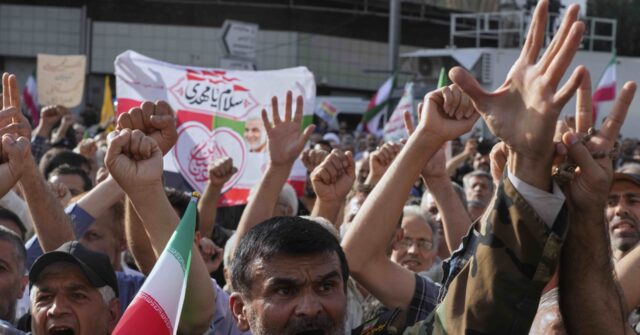Israel attacked key institutions of the Iranian regime on Monday, targeting sites associated with the tyranny of the Ayatollahs — and potentially creating an opening for domestic opponents of their rule to rise against it.
Among the targets on Monday were the Iranian Revolutionary Guard Corps (IRGC), an elite force that the U.S. considers a terrorist organization, and which also profits financially from its role in the regime’s exploits.
Israel’s Army Radio reported that in its attacks on the IRGC, the Israel Defense Forces (IDF) departed from its usual practice of sending warnings ahead of airstrikes to minimize casualties. In this case, the IDF aimed to kill as many IRGC soldiers as possible. Army Radio said that dozens had likely been killed in their bases.
The IDF said in a statement:
During the recent series of strikes, the IDF struck several military command centers belonging to the Iranian regime, including the “Thar-Allah” command center. The general command center, under the IRGC, is designated to defend Tehran from security threats, including internal threats.
Additionally, the “Sayyed al-Shuhada” Corps was struck. The “Sayyed al-Shuhada” Corps is subordinate to the IRGC and is responsible for homeland defense and the suppression of internal threats.
The IDF also struck the General Intelligence Directorate of the Internal Security forces, responsible for supervising the employees of the internal security wing and oversees the supervision and control of information and media of the organization.
The IDF continues the ongoing effort to degrade the Iranian regime’s military capabilities and will persist in its efforts to ensure the security of the State of Israel.
Israel also renewed its attacks on the Basij, the paramilitary force responsible for policing political dissent. And Israeli warplanes also reportedly attacked the entrance to the notorious Evin Prison — not the facility itself, but just the gates, potentially allowing thousands of political prisoners to escape and resist the regime.
Other attacks targeted symbols of the regime. Israel destroyed a “doomsday clock” in the heart of Tehran’s Palestine Square, which counted down until the destruction of the “Zionist regime” (supposedly in 2040).
Israel has complained to the United Nations about the clock in the past, saying that it shows the true genocidal intent of the Iranian regime.
One analyst on Army Radio suggested that Israel saw the war winding down and wanted to inflict the most damage possible on the regime as the war ended, to increase the possibility of an eventual political change.
Iran also attacked Israel with several small barrages of missiles over the course of the morning, though all of them were intercepted and there were no reports of injuries. One Iranian missile hit a power station in southern Israel that caused a temporary disruption in electricity to the area; Israel also hit a power station in northern Tehran, disrupting electricity to the Iranian capital.
Israel also hit access roads to the Fordow nuclear site that was bombed by the U.S. over the weekend. The damage caused by the American airstrike has yet to be determined but is likely to have been significant.
Joel B. Pollak is Senior Editor-at-Large at Breitbart News and the host of Breitbart News Sunday on Sirius XM Patriot on Sunday evenings from 7 p.m. to 10 p.m. ET (4 p.m. to 7 p.m. PT). He is the author of Trump 2.0: The Most Dramatic ‘First 100 Days’ in Presidential History, available for Amazon Kindle. He is also the author of The Trumpian Virtues: The Lessons and Legacy of Donald Trump’s Presidency, now available on Audible. He is a winner of the 2018 Robert Novak Journalism Alumni Fellowship. Follow him on Twitter at @joelpollak.
Read the full article here
